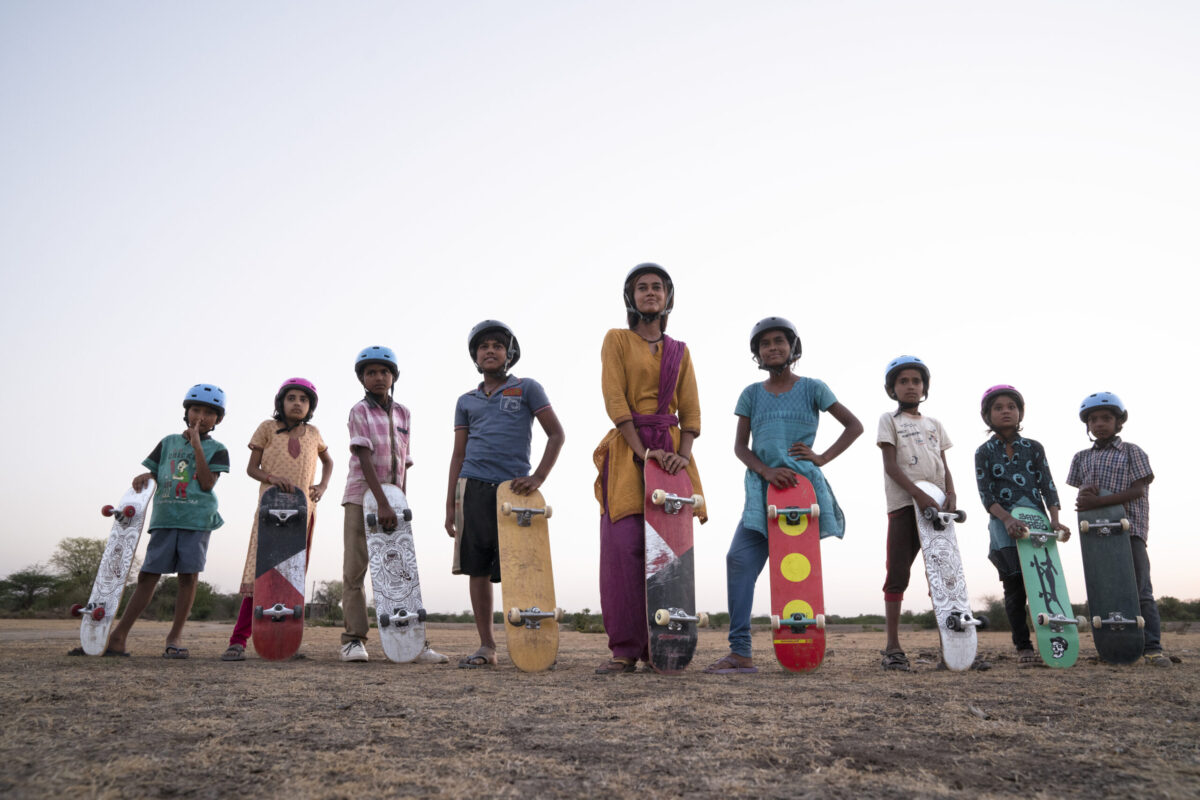Netflix’s Skater Girl Is a Tender, Nuanced Coming of Age Tale
4/5 bearing carts.

Movies about skateboarding have a certain narrative, one that usually revolves around a shaggy group of misfit teens who find community in a sport that is often villainized as a social nuisance. These teens, by and large, are usually white, American, and male. That alone makes Manjari Makijany’s debut film Skater Girl, about impoverished kids in a rural Indian village introduced to skateboarding, revolutionary in its own right.
It’s also not the only story this deceptively complex film has to offer. Skater Girl follows Prerna (a revelatory Rachel Saanchita Gupta), a teenage girl living in a small village in Rajasthan, India. Born into a lower caste, impoverished family, Prerna spends her days taking her brother to school (but not attending herself), selling peanuts in the market, and doing chores at home. On the rare days she is allowed to attend school, she is mocked by both students and teachers for being unable to afford a uniform that fits or a school textbook. At home, she must contend with her strict, proud father who would rather see his family go hungry than endure the shame of the women in his home working.
Prerna’s world view is expanded by the arrival of Jessica (Amy Maghera), a London advertising executive. Jessica is on a mission to connect with her dead father by visiting the village he grew up in, but she quickly takes an interest in Prerna. When she sees Prerna and her brother Ankush playing with a bearing cart, she recognizes potential. And when her American friend Erick (Jonathan Readwin) arrives in the village toting his skateboard, the children are captivated.
A skateboarding demonstration for the village children leads to Jessica impulsively buying skateboards for the town (but no pads or helmets, yikes!). The kids become obsessed with skateboarding, much to the annoyance of the town elders, who quickly prohibit skateboarding. Jessica comes up with a crafty solution: building the region’s first skate park and launching a competition.
Prerna shows a natural talent for the sport, but the film is more focused on how skateboarding makes her feel. In a society where women are expected to conform to a very specific role, she finds freedom and confidence on a skateboard. This revelation inspires her to imagine a life beyond teen marriage and childbearing, a life where she is allowed to have dreams of her own.
The film smartly takes on the “white/foreign savior” trope by confronting Jessica with the realities of upending the small town. The government officials are angry that she’s dropping in to cause chaos, which sees kids skipping school en masse to go skate. And parents are upset that the introduction of skateboards means the introduction of other forbidden behaviors, like female independence or fraternizing outside your caste.
Makijany, who worked as the second unit assistant director on films like Dunkirk, Wonder Woman, and The Dark Knight Rises, delivers dreamy, gorgeously shot images of the kids skateboarding, and especially of Prerna as she falls in love with the sport. When she’s gliding through the streets on her board, she looks like a superhero.
The film is anchored by strong, empathetic performances from its actors, especially the child actors. And while the plot may get wobbly and predictable at times, the film offers a moving, emotional look at the power of giving kids a dream. At the film’s start, Jessica asks Prerna what she wants to be when she grows up. Prerna is baffled, as no one has ever asked her that question before. As for Prerna’s future, it’s unclear where she will end up. But now she knows that there isn’t only one option for her future, and that there is promise in the possibilities.
In a lovely real world coda to the film, the end credits reveal that the skate park built for the film is now a permanent skate park for the local community. It remains one of India’s largest skate parks, and the first one in Rajasthan. How many films can boast such a tangible positive impact on the community they film in?
Skater Girl is currently streaming on Netflix.
(image: Kerry Monteen/Netflix)
Want more stories like this? Become a subscriber and support the site!
—The Mary Sue has a strict comment policy that forbids, but is not limited to, personal insults toward anyone, hate speech, and trolling.—
Have a tip we should know? tips@themarysue.com